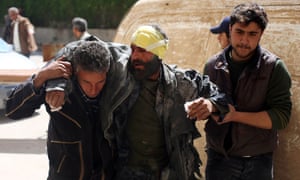
France has become the first major western power to directly accuse the Syrian government of violating the country’s ceasefire, saying airstrikes this week were intended to terrorise people and sap the international community’s efforts to find a political solution to the conflict.
Britain also produced a lengthy update on the state of the war, including numerous accounts of breaches of the partial ceasefire that came into force on 27 February.
A joint US-Russian monitoring operation based in Geneva is supposed to oversee ceasefire breaches, but there is no agreed mechanism for imposing sanctions on those responsible. The issue was discussed on Friday in Geneva, where peace talks are being held.
The condemnation from the French foreign ministry spokesman, Romain Nadal, came after airstrikes on the outskirts of Damascus reportedly killed 32 people, including civilians.
“France condemns the airstrikes carried out by the regime,” Nadal told reporters during a weekly briefing. “This attack, which deliberately targeted civilians, including children, shows that the regime is continuing its abuses and violating the truce.
“This abject act is designed to terrorise the Syrian people and sap efforts by the international community to find a political solution.”
The Syrian Observatory for Human Rights, a UK-based monitoring group, said earlier that Thursday’s airstrikes on the Deir al-Asafir district in south-eastern Damascus had mostly killed women and children.
The agreed ceasefire does not apply to attacks on areas held by Islamic State or the al-Nusra Front. Gareth Bayley, the UK’s Syria envoy, described the reports as deeply distressing, and said many civilians had also been killed in eastern Ghouta and Aleppo.
The UK said 14 raids on Deir al-Asafir had been reported, including strikes on a school and mosque. A civil defence unit that attended the scene counted 25 bodies, while the local council put the death toll at 32.
The Syrian government claims the al-Nusra Front and Isis operate in the area where the airstrikes took place.
Diplomats will be concerned that the ceasefire breaches, and slow progress reported on extending humanitarian access, may mean the Syrian opposition will threaten not to return to the Geneva talks, which are due to resume on 9 April.
Senior opposition military figures have been meeting in Turkey this week to discuss the state of the ceasefire.
Speaking in interviews with the Russian press, Syria’s president, Bashar al-Assad, has suggested he might be willing to discuss a political transition.
The British foreign secretary, Phillip Hammond, however said on Thursday: “Bashar al-Assad talks about a unity government, by which he means bringing one or two handpicked, regime-friendly oppositionists into minor posts in the government. That is not sufficient.”
Britain and other powers which make up the international Syria support group believe a transitional government is needed to bring about a political settlement to the country’s civil war.
No comments:
Post a Comment